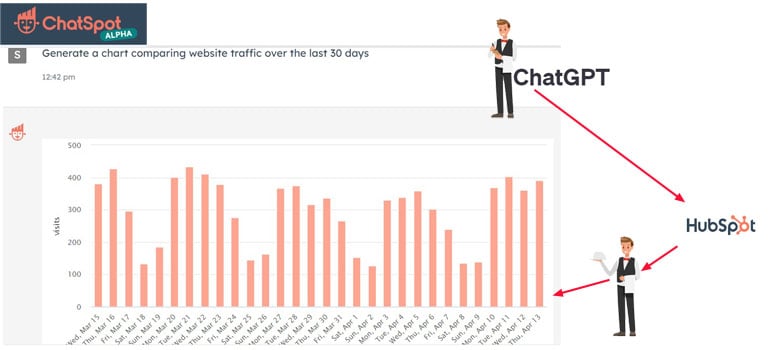As artificial intelligence (AI) tools like ChatGPT explode in popularity and are layered onto platforms like HubSpot CRMs, many credit unions raise questions about the safety of using them. We have heard questions such as:
- Who owns the information created by ChatGPT?
- Is your data at risk if you integrate a tool like ChatSpot into your HubSpot CRM?
- Will the information in my queries be available to anyone on the internet?

These are important questions particularly since the common use of the technology is still in the infancy stage. There is no governance over it and very little information is available about repercussions to anyone who causes harm using it. And users aren’t familiar with the risks associated with seemingly harmless queries - but should be cautious with the information submitted when prompting AI tools for answers.
An article by Axios reveals that “companies are struggling to keep corporate secrets out of ChatGPT”. For example, a popular use of ChatGPT is for engineers and programmers to ask it for help with coding/syntax questions. They use ChatGPT to refine code or double-check their work. AI can save enormous amounts of time and frustration so it is an appealing use of the tool. However, if the code in the query contains proprietary or private data, it becomes part of the rich data bank ChatGPT uses going forward. There’s no way to remove information once it is submitted - so employers are rightfully concerned that their private data could be at risk if someone at the company is careless with it. The need for employee education and policy implementation on how to use and not use ChatGPT is growing. To be safe, some companies like Verizon and JPMorgan Chase have blocked employees’ access to it.
For credit unions looking to use the tool effectively, we’ve compiled some questions and answers to help use ChatGPT for the benefits and avoid risks.
Will the information I input into ChatGPT become public information?
The Terms of Service say that input data may be used “to train and improve its models” - meaning anything you input into ChatGPT can be used to feed the machine’s knowledge bank and be distributed to other users.
The terms of service state that you can opt out of your input being used to improve its non-API services. Time will tell whether this opt-out is effective, but the safe route is not inputting anything sensitive into AI queries.
Do I have rights to the output created by ChatGPT?
OpenAI’s terms of service state that you are assigned the rights to the output and can use it for any purpose: “Subject to your compliance with these Terms, OpenAI hereby assigns to you all its right, title and interest in and to Output. This means you can use Content for any purpose, including commercial purposes such as sale or publication if you comply with these Terms.”
Can I use ChatGPT to write content for my inbound marketing strategy?
You can, but we do not recommend it. AI-generated content is detectable by search engines which means if Google scans your site and finds that content, even if it is a perfect keyword match, it won’t see your content as unique. AI-generated content is not likely to rank well on search results pages so should not be used to create copy for blog posts or web pages.
However, it is a great resource to:
- Research and develop buyer personas
- Plan a series of content that appeals to those personas
- Generate outlines for each topic
- Research topics
- Research competitor content
- Write social posts or emails promoting the page on your website
The writing of copy for your website should be done by a human, however.
If I use ChatSpot (integrating ChatGPT with my HubSpot account) are my customer and company data at risk?
According to the terms of service, data from HubSpot does not pass through to ChatGPT, only the query typed into ChatSpot is accessible to ChatGPT. ChatGPT then sends AI instructions to the CRM about what information to serve the user.
ChatSpot is an API - a language used to integrate ChatGPT with other platforms. The ChatGPT Terms of Use say that it does not use API data to improve its user service (translated: data from the CRM does not feed back into the Open AI data set). According to ChatSpot.ai’s FAQs, the prompts/queries you enter into ChatSpot may be used to “train and improve their models” but results from the data in your CRM are not accessible to Open AI.
Users should consider the information they are using in their ChatSpot prompts, such as, “Add Sam@xyz.com to my contact list and set a task reminder to call Sam Higgins on Monday” because the email address used in the prompt will be accessible to Open AI.
As a credit union on HubSpot CRM, should I integrate ChatSpot.ai into my HubSpot account? Is it safe?
Chris Leone, CEO of WebStrategies a digital marketing agency that specializes in credit unions, and a leading promoter of ChatGPT and AI tools says,
 “I recommend a “wait-and-see” approach until the security and privacy of the CRM data is more clear. As a general rule of thumb, don’t provide any data to these tools you’re not comfortable getting stored or sold to third parties.
“I recommend a “wait-and-see” approach until the security and privacy of the CRM data is more clear. As a general rule of thumb, don’t provide any data to these tools you’re not comfortable getting stored or sold to third parties.
Glossary of Terms (relative to this article)
AI (artificial intelligence) - the ability of machines to perform tasks that would normally require human intelligence
API - Application Programming Interface is the way different software applications communicate with each other and share information. It is like a waiter in a restaurant that takes your order and returns with your food.
ChatGPT - natural language model artificial intelligence website that allows users to enter questions (prompts/queries/input) in a conversational style. The AI tool uses its vast dataset (the internet up through September 2021) to compile answers to the question in a way that seems like a conversation with a human. Through prompt engineering (how the user asks questions) the interaction can continue with follow-up questions, clarifications, and further instructions. It also creates content that can be used for a variety of purposes. There is currently a paid and free version available.
ChatSpot - An API that connects ChatGPT and a user’s HubSpot account. It leverages the power of AI to make tasks easier through natural language queries.
Non-API - There is not an API in the interaction, such as when the user goes directly to ChatGPT.
OpenAI - an artificial intelligence research and deployment company, most notably running ChatGPT and Dall-e 2
Prompt/Query - the question typed into AI tool seeking a machine learning response
Additional Resources
Webinar: ChatGPT for Credit Unions







Agree, disagree, or just have something to add?
Leave a comment below.